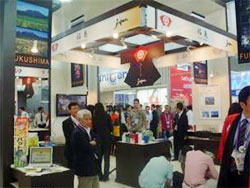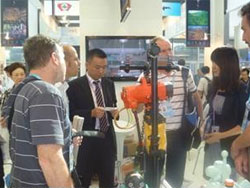Rebuilding Japan
Japan Booth at the Canton Fair: Companies from Three Quake-hit Prefectures Exhibit Japanese-Chinese Government Cooperation in Post-Disaster Support
November 9, 2011, Guangzhou, China
The 110th Chinese Import and Export Fair (known as the Canton Fair) was held from October 15 to 19 in the city of Guangzhou, China. A Japan Booth section was set up this year to enhance cooperation between Japan and China in support for the region struck by the March 11 Great East Japan Earthquake. The exhibitors included ten companies and two organizations from the earthquake-stricken prefectures of Iwate, Miyagi, and Fukushima. On October 14th, the day before the fair opened, Chinese Premier Wen Jiabao and Yukio Edano, Minister of Economy, Trade, and Industry, visited the Japan Booth.
288 Contracts Signed at the Japan Booth
The Japan Booth at this fair, which was organized by the Chinese Ministry of Commerce, was proposed and implemented in accord with the joint statement on the enhancement of economic and trade cooperation after the Great East Japan Earthquake signed by Banri Kaieda, then Japan's Minister of Economy, Trade, and Industry, and Chen Deming, Minister of Commerce of China, on May 21.
The Japan Booth was located in the International Pavilion (hall 9-3) during Phase I of the fair, October 15 to 19. Within it were 22 sections with a total exhibition area of 198 square meters. It consisted of zones for displaying products from the area worst hit by the earthquake, with ten companies and two organizations participating (three companies and two organizations from Iwate, four companies from Miyagi, and three from Fukushima), plus PR zones for Japanese foods and for tourism in Japan, a special section for countering the misinformation that has spread since the quake, a general reception area, and an office. According to the Chinese Ministry of Commerce, during the fifteenth to the eighteenth of October, the first five days of Phase I, 105,421 buyers visited the fair. At the Japan Booth, fair participants engaged in 828 sets of business discussions which led to the signing of 288 contracts (including some prospective contracts) and generated 642,250 dollars in orders.

Visitors constantly thronged the Japan Booth.
On the morning of October 14, before to the opening of the Canton Fair on the fifteenth, China's Premier Wen Jiabao and Chen Deming, Minister of Commerce were accompanied on their visit to the Japan Booth by Japan's Yukio Edano, Minister of Economy, Trade and Industry, who explained what was being presented.
Successful Expansion of Sales Network
One of the exhibitors was Hayasaka MFG. Co., Ltd., a threading tool manufacturer based in Kami-gun, Miyagi Prefecture, which produces conical drills, taps and dies. Marketing their products through three wholesalers in Dongguan, Guangdong Province, currently generates monthly sales of 35 million yen. Hayasaka's goal in participating in the fair was to expand its sales network into areas beyond the south of China. "During the fair, we held substantial talks with four new Chinese buyers about sales contracts and closed deals of on the order of 2 million yen with two of those companies," reported Managing Director Yoshinobu Hayasaka.
Hayasaka added, "The Canton Fair attracted many buyers from the Middle East, Africa, and other regions overseas. We even had the opportunity to talk with Estonian and Cambodian buyers, whom we hardly ever see at trade fairs in Japan. That made participating in this fair a real plus." He saw great potential for expanding into countries and regions that are as yet untapped markets for his company's products, through the Canton Fair.
He also praised the Disaster Area Support Booth jointly run by the Japanese and Chinese governments. "We had a lot of media coverage, mainly from Japan and China, and were able to get out word about how the area hit by the disaster is anything but defeated. It was a truly meaningful opportunity."
Sensing Keen Interest in Japanese Brands
Magfine Corporation is an airtight resin coating and permanent magnet manufacturer based in Sendai, Miyagi Prefecture, whose core business is a high-end coating technology that aids in producing airtight resin-coated products such as electric parts, magnets, necklaces, and accessories. Magfine carries out its electric parts coating operation at its own production center in Shenzhen, China, and the coating process for magnets, necklaces, and bracelets in Japan. It plans exports and sales of those products in China in the near future.
During the fair, Magfine held business talks with buyers from 20 companies, half of them from other countries, including Germany's leading magnet supplier and buyers from Egypt. Vice President Takashi Osada said, "Global buyers visit the Japan Booth because they expect high quality from Japanese brands." He gained a good sense of the keen interest shown in made-in-Japan products.
Opportunity to Introduce Products to Buyers
Sanei Seiki Seisakusho Co., Ltd., located in Date-gun, Fukushima Prefecture, is a manufacturer of pneumatic machinery such as air motors and air hoists. It currently sells its products in China through distributors in Tianjin, Shanghai, and Shenzhen, and plans to expand its distribution routes in the central and western areas of China. No order was signed this time, however. "Our products are not the kind of merchandise that can lead us to expect to sign contracts immediately, right on the spot. It is important for us to focus on giving more product presentations to buyers. Through exhibiting at this fair, we conducted talks with 30 or 40 Chinese buyers and will definitely keep in touch with them," said Mr. LinHai, a Sanei Seiki employee, anticipating its sales routes in China will expand thanks to the Canton Fair.
Traditional Crafts Attract Consumers
The Iwayado Tansu Seisan Kyoudo Kumiai (the Iwayado Tansu Production Cooperative) was formed by five companies that produce tansu or traditional Japanese chests in Oshu, Iwate prefecture. Its members currently are exporting to Germany, Switzerland, and Russia, but taking part in the Canton Fair was the cooperative's first attempt to expand its exports to China and other parts of Asia. "We learnt that Chinese consumers are really interested in Japanese tansu, yet no buyer made a move to buy them in quantity. We're considering exhibiting at furniture sample fairs in China in the future," said Iwayado member Go Oikawa, who experienced the power of China's thriving consumer culture.
Mizusawa Imono Kogyo Kyodokumiai (the Mizusawa Foundry Co-op Association), which showcased Nambu Tekki (Nambu cast ironware), a traditional craft in Iwate, also received favorable responses from consumers as well as positive feedback from wholesalers and retailers.

Lively business talks with buyers from overseas.
The Canton Fair is China's biggest international trade show, attracting not only domestic but also overseas buyers who seek new sales outlets and business partners. It can provide a platform from which companies can open up international markets for their products and offers superb opportunities to develop new sales routes.
The fair has historically attracted many traders from the Middle East, Africa, and Eastern Europe, as well as a striking number of buyers from neighboring Asian countries. In many cases, visa issues prevent those buyers from attending the major international trade shows held in Japan and the Western countries. Thus, what makes the Canton Fair special is not only its vast scale but also that it attracts a great diversity of buyers from all over whom Japanese companies would be unlikely to meet at the other fairs they usually attend. It certainly appears that attending this year's fair has been a fruitful way for the Japanese companies and organizations in the area impacted by the earthquake to expand their sales routes.
| * | JETRO organized the Japan Pavilion at the Canton Fair where the Japan Booth was set. |
|---|



